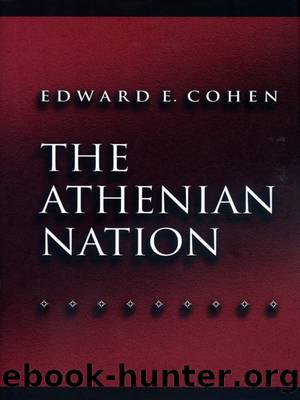The Athenian Nation by Cohen Edward;

Author:Cohen, Edward;
Language: eng
Format: epub
Publisher: Princeton University Press
Published: 2008-08-14T16:00:00+00:00
5
Wealthy Slaves in a “Slave Society”
At Athens some slaves live magnificently and prop-erly so.
The Constitution of the Athenians
(attributed to Xenophon)1
A slave bears only this dishonor: the name. In every other way a slave is equal to the free
Euripides, Ion2
DESPITE the ubiquitous presence of unfree individuals in virtually all human communities,3 Attika constitutes one of the few attested true “slave economies”4—those in which the contribution of a large number of unfree persons to the totality of wealth production is so substantial that a society’s overall production, distribution, and consumption is highly dependent on slave labor.5 But while the prevalence and importance of slavery in ancient Athens is well known, the phenomenon of wealthy slaves and, in particular, the institution of the khris oikountes (unfree persons maintaining their own households) are generally unknown, partly as a result of scholarship which has, since Roman times, denied the existence of this group of slaves (who are in fact well attested in Athenian sources).6 Writing in the Roman imperial period, centuries after the demise of an independent Athens, the lexicographer Harpokratin insists that the persons described in Athenian sources as “slaves maintaining independent households” must have been “ex-slaves”: his tautological reasoning—the term khris oikountes must refer not to slaves but to freedmen, since slaves would have resided with their masters (as they did in his time).7
Two millennia later, confronting the description in Aiskhins 1 of the destruction of the slave Pittalakos’s home (the ruin of his furniture, the murder of his beloved pets, and the wreckage of other property), the British scholar Todd still seeks to reject this evidence of independent servile domicile by suggesting that Pittalakos might not really have been a slave (1993: 192–94)—despite repeated, explicit reference in Aiskhins’s text to Pittalakos’s servitude.8 Modern historians’ refusal to accept the evidence of the ancient Athenian sources derives, at least in part, from preconceptions generated by the enormously influential and relatively recent slave society of North America. Yet, analyzed both within Athenian context and within the experience of other slave societies (including theAmerican South), attainment of high position and considerable wealth at Athens by a relatively few enslaved individuals presents no cause for desperate disbelief on a priori grounds. In Babylonia and in Rome in antiquity, and in sub-Saharan Africa and the Islamic world in the medieval period, some slaves functioned as high military officers, as powerful administrators, and as important (and sometimes wealthy) businessmen.9 In the 1820s, in the Cape Colony of southwestern Africa, then under British control, enslaved herdsmen lived on their own for extended periods, tending livestock in remote interior regions, a reflection of economic requirements and of the paucity of white authority beyond the limited area of colonial settlement (Davis 1996: 51; 1998: ix). Like-wise, the khris oikountes at Athens and the related phenomenon of wealthy slaves appear to have been merely an appropriate manifestation of communal realities, which virtually mandated the commercial activities of those unfree businessmen and enslaved civil servants who amassed at Athens considerable wealth and authority—a “slave
Download
This site does not store any files on its server. We only index and link to content provided by other sites. Please contact the content providers to delete copyright contents if any and email us, we'll remove relevant links or contents immediately.
| Africa | Americas |
| Arctic & Antarctica | Asia |
| Australia & Oceania | Europe |
| Middle East | Russia |
| United States | World |
| Ancient Civilizations | Military |
| Historical Study & Educational Resources |
The Battle of Mogadishu by Matt Eversmann & Dan Schilling(737)
The Confidence Men by Margalit Fox(701)
The Spymaster of Baghdad by Margaret Coker(661)
A History of the Muslim World since 1260: The Making of a Global Community by Vernon O. Egger(659)
Jack the Ripper and the East End by Peter Ackroyd(632)
Empire of Fear: Inside the Islamic State by Andrew Hosken(608)
The Afghanistan File by Prince Turki AlFaisal Al Saud(605)
The Crimean War by Winfried Baumgart(597)
Islam At The Gates: How Christendom Defeated the Ottoman Turks by Diane Moczar(595)
Akhenaten by Dominic Montserrat(590)
The Jerusalem Diamond by Noah Gordon(588)
Beirut 2020 by Charif Majdalani(580)
A Concise History of Greece (Cambridge Concise Histories) by Richard Clogg(572)
The History of Jihad by Robert Spencer(571)
Enemy in the East by Rolf-Dieter Müller(553)
The Privatization of Israeli Security by Shir Hever(547)
Israel: Ancient Kingdom or Late Invention? by Daniel I. Block(546)
Destroying a Nation: The Civil War in Syria by Nikolaos van Dam(538)
The Nine Lives of Pakistan by Declan WALSH(537)
